The key to sustained success of any organization depends on the effective implementation of the Quality Management System within the organization. Along with an effective implemented Quality Management System, come myriad benefits. Implementing a Quality Management System will help you
- Assess the overall context of your organization and eventually establish objectives which are in line with business goals.
- To consistently provide products / services that meet customer and applicable legal requirements.
- Put your customer first and meet their needs and enhance their satisfaction.
- Work in a more efficient way which will result in greater productivity and reduce costs.
- Expand into new markets by having an edge over your competitors.
- Identify and address risks associated with your organization.
Overview
ISO 9000-2015 Implementation Training & Certification
The key to sustained success of any organization depends on the effective implementation of the Quality Management System within the organization. Along with an effective implemented Quality Management System, come myriad benefits.
Implementing a Quality Management System will help you
- Assess the overall context of your organization and eventually establish objectives which are in line with business goals.
- To consistently provide products / services that meet customer and applicable legal requirements.
- Put your customer first and meet their needs and enhance their satisfaction.
- Work in a more efficient way which will result in greater productivity and reduce costs.
- Expand into new markets by having an edge over your competitors.
- Identify and address risks associated with your organization.
Course Outline
ISO 9000-2015 Implementation Training & Certification
- Quality concepts and process approach – Definitions, QM principles, Annex SL – High level structure, PDCA, Risk based thinking, Benefits of and purpose of Quality Management System (QMS).
- Requirements of ISO 9001:2015 and mandatory documented information.
- Company’s mission, vision and policy.
- Framing QMS scope statement.
- Implementing process approach requirements.
- Setting objectives & planning to achieve them.
- Managing risks (Identifying and addressing risks and opportunities)
- Conducting internal audits and management reviews
- Management program for continual Improvement
Benefit
ISO 9000-2015 Implementation Training & Certification
- Interpret the requirements and implement an effective Quality Management System.
- Understand the key differences between ISO 9001:2008 and ISO 9001:2015.
- Understand the benefits in implementing an effective Quality Management System..
- Identify and address risks associated with their organization.
- Identify mandatory documented information required by ISO 9001:2015 standard.
- Understand how to effectively establish, implement, maintain and continually improve the Quality Management System.
Who Should Attend
ISO 9000-2015 Implementation Training & Certification
- Professionals who have a role in implementation of QMS,
- Persons responsible for establishing, implementing, maintaining and improving QMS,
- Management system consultants.
Exam Information
ISO 9000-2015 Implementation Training & Certification
Exam prerequisites:
- QMS foundation training or prior knowledge about ISO 9001 standard is desirable. This certification does not fill the gaps in the knowledge about the standard; but for evaluates the knowledge with regards to implementation context. AND
- Student shall have minimum of two years of professional working experience in quality management system
Exam Format:
- The examination will be divided into two sections
- Both sections are to be attempted
- Total marks : 60 out which 40 marks will be MCQs and 20 marks will be case studies.
- Passing standard is 70 % (42 marks out of 60 marks)
- This is open book exam. Only QMS standard copy and course notes from the participant handout are permissible.
Section A
- Multiple choice based questions
- Total 40 questions in section A
- Total marks of section A: 40
- Each question is of one mark
- Marks of each case study: 10
- Total marks of section B: 20
Part B
1′ No. of case studies: 2 (There will be minimum 5 questions per case study which needs to be responded. The questions will be subjective in nature)
ISO31000 http://www.info-savvy.com/product/iso-31000-risk-management-certified-risk-manager/
ISO27001 http://www.info-savvy.com/product/iso-27001-lead-auditor-training-and-certification-isms/
ISO20001 http://www.info-savvy.com/product/iso-20001-itsm-implementation/
ISO 9000-2015 Implementation http://www.info-savvy.com/product/iso-9000-2015-implementation/

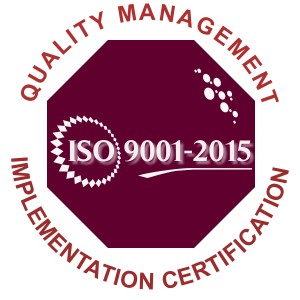


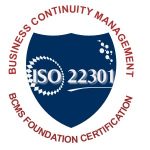
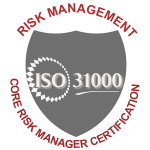
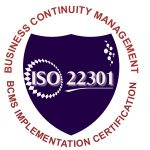
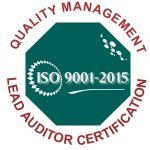


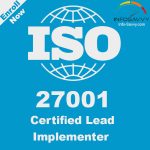

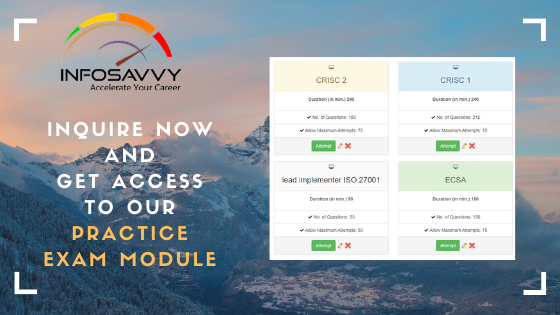
Reviews
There are no reviews yet.